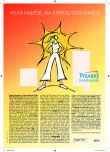Spontaneous Regression of Sequestrated Lumbar Disc Herniation – Three Case Reports
Authors:
Andrea Burgetová 1
; Z. Seidl 1,2; M. Mašek 1; P. Dušek 3; P. Hostaša 1; J. Němcová 2; M. Vaněčková 1
Authors‘ workplace:
Radiodiagnostická klinika 1. LF UK a VFN v Praze
1; Vyšší zdravotnická škola, Praha
2; Neurologická klinika 1. LF UK a VFN v Praze
3
Published in:
Cesk Slov Neurol N 2010; 73/106(6): 721-724
Category:
Case Report
Overview
An improvement of clinical symptoms of radicular syndrome caused by a free disc fragment accompanying disc herniation in the course of conservative therapy is not unusual in some patients. The pathophysiological processes that underlie this improvement are not fully understood. We present three patients who experienced a partial or complete resorption of disc herniation-free disc fragment in the lumbar region, which was accompanied by an amelioration of clinical symptoms and documented by magnetic resonance imaging (MRI). The aim is to support the position that MRI has not only diagnostic value but also, as is addressed in the discussion, the potential to provide prognostic information for any spontaneous regression of hernia and make easier the decision of whether to proceed with conservative or surgical therapy.
Key words:
disc herniation – sequestrated disc regression – magnetic resonance imaging – conservative treatment
Sources
1. Bozzao A, Gallucci M, Masciocchi C, Aprile I, Barile A, Passariello R. Lumbar disk herniation: MR imaging assessment of natural history in patient treated without surgery. Radiology 1992; 185(1): 135–141.
2. Schoenfeld AJ, Weiner BK. Treatment of lumbar disc herniation: Evidence-based practice. Int J Gen Med 2010; 3 : 209–214.
3. Saal JS, Saal JA, Yurth EF. Nonoperative treatment of herniated lumbar intervertebral disc with radiculopathy. An outcome study. Spine 1989; 14(4): 431–437.
4. Weinstein JN, Lurie JD, Tosteson TD, Tosteson AN, Blood EA, Abdu WA et al. Surgical versus nonoperative treatment for lumbar disc herniation: Four-year results for the Spine Patient Outcomes Research Trial (SPORT). Spine 2008; 33(25): 2789–2800.
5. Guinto FC jr, Hashim H, Stumer M. CT demonstration of disk regression after conservative therapy. AJNR Am J Neuroradiol 1984; 5(5): 632–633.
6. Komori H, Shinomiya K, Nakai O, Yamaura I, Takeda S, Furuya K. The natural history of herniated nucleus pulposus with radiculopathy. Spine 1996; 21(2): 225–229.
7. Mraček J. Intradurální výhřez bederní meziobratlové ploténky manifestující se syndromem kaudy – kazuistika. Cesk Slov Neurol N 2008; 71/104(5): 594–598.
8. Komori H, Okawa A, Haro H Muneta T, Mamamoto H, Shinomiya K. Contrast-enhanced magnetic resonance imaging in conservative management of lumbar disc herniation. Spine 1998; 23(1): 67–73.
9. Splendiani A. Puglielli E, De Amicis R, Barile A, Masciocchi C, Gallucci M. Spontaneous resolution of lumbar disk herniation: predictive signs for prognostic evaluation. Neuroradiology 2004; 46(11): 916–922.
10. Doita M, Kanatani T, Ozaki T, Matsui N, Kurosaka M, Yoshiya S. Influence of macrophage infiltration of herniated disc tissue on the production of matrix metalloproteinases leading to disc resorption. Spine 2001; 26(14): 1522–1527.
11. Ikeda T, Nakamura T, Kikuchi T, Umeda S, Senda H, Tagaki K. Pathomechanism of spontaneous regression of the herniated lumbar disc: histologic and immunohistochemical study. J Spinal Disord 1996; 9(2):136–140.
Labels
Paediatric neurology Neurosurgery NeurologyArticle was published in
Czech and Slovak Neurology and Neurosurgery

2010 Issue 6
- Advances in the Treatment of Myasthenia Gravis on the Horizon
- Memantine in Dementia Therapy – Current Findings and Possible Future Applications
- Memantine Eases Daily Life for Patients and Caregivers
-
All articles in this issue
- Autisms
- The Mechanisms of Neurodegeneration in Parkinson’s Disease
- Obstructive Sleep Apnea Syndrome and Complications of Cardiovascular Disorders – the Role of Interdisciplinary Cooperation
- Neurotransmitter Disorders in Childhood and Differential Diagnosis
- Spectral Analysis of Heart Rate Variability – Normative Data
- The Bristol Activities of Daily Living Scale BADLS-CZ for the Evaluation of Patients with Dementia
- Endovascular Recanalization in the Treatment of Acute Occlusion of the Brain Arteries
- Comparison of the Benefits of the Lumbar Infusion Test and Lumbar Drainage in the Treatment of Hydrocephalus
- A Scale for the Assessment and Rating of Ataxia
- Monitoring PtiO2 and Changes in Oxygen Fraction in the Breathed Mixture after Severe Subarachnoid Haemorrhage
- Radial Nerve Lesions and the Possibilities of Functional Reconstruction Using Late Tendon Transfer
- Cranial Neural Tube Defects
- The Use of Continuous Cerebral Blood Flow Monitoring after Severe Head Injury
- Our Experience with MRI Monitoring of Multiple Sclerosis Patients in Clinical Practice
- Spontaneous Regression of Sequestrated Lumbar Disc Herniation – Three Case Reports
- Lymphomatous Neuropathy (Neurolymphomatosis) – a Case Report
- Assessment of State of Health and Capacity for Work in Post-Stroke Patients – Case Reports
- Fibrous Dysplasia of Ribs and Spine: Multidisciplinary Solution – a Case Report
- Czech and Slovak Neurology and Neurosurgery
- Journal archive
- Current issue
- About the journal
Most read in this issue
- Spontaneous Regression of Sequestrated Lumbar Disc Herniation – Three Case Reports
- Assessment of State of Health and Capacity for Work in Post-Stroke Patients – Case Reports
- The Bristol Activities of Daily Living Scale BADLS-CZ for the Evaluation of Patients with Dementia
- Autisms
